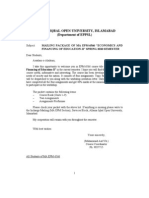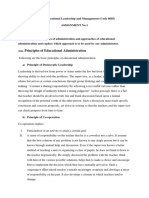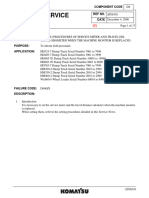0 ratings0% found this document useful (0 votes)
246 viewsLMS and CMS
LMS and CMS
Uploaded by
lakshmipriyaThis document discusses and compares Learning Management Systems (LMS) and Course Management Systems (CMS). It defines LMS as a software application used to administer, track, and deliver online educational courses. It provides examples of LMS functionality. CMS is defined as a set of tools that allow instructors to create and post online course content without programming. While similar, CMS focuses more on teaching and learning aspects, while LMS encompasses additional features like skills tracking and performance management. Major providers of these systems are also listed.
Copyright:
© All Rights Reserved
Available Formats
Download as PPTX, PDF, TXT or read online from Scribd
LMS and CMS
LMS and CMS
Uploaded by
lakshmipriya0 ratings0% found this document useful (0 votes)
246 views14 pagesThis document discusses and compares Learning Management Systems (LMS) and Course Management Systems (CMS). It defines LMS as a software application used to administer, track, and deliver online educational courses. It provides examples of LMS functionality. CMS is defined as a set of tools that allow instructors to create and post online course content without programming. While similar, CMS focuses more on teaching and learning aspects, while LMS encompasses additional features like skills tracking and performance management. Major providers of these systems are also listed.
Original Description:
LMS AND CMS- educational technology
Original Title
LMS AND CMS
Copyright
© © All Rights Reserved
Available Formats
PPTX, PDF, TXT or read online from Scribd
Share this document
Did you find this document useful?
Is this content inappropriate?
This document discusses and compares Learning Management Systems (LMS) and Course Management Systems (CMS). It defines LMS as a software application used to administer, track, and deliver online educational courses. It provides examples of LMS functionality. CMS is defined as a set of tools that allow instructors to create and post online course content without programming. While similar, CMS focuses more on teaching and learning aspects, while LMS encompasses additional features like skills tracking and performance management. Major providers of these systems are also listed.
Copyright:
© All Rights Reserved
Available Formats
Download as PPTX, PDF, TXT or read online from Scribd
Download as pptx, pdf, or txt
0 ratings0% found this document useful (0 votes)
246 views14 pagesLMS and CMS
LMS and CMS
Uploaded by
lakshmipriyaThis document discusses and compares Learning Management Systems (LMS) and Course Management Systems (CMS). It defines LMS as a software application used to administer, track, and deliver online educational courses. It provides examples of LMS functionality. CMS is defined as a set of tools that allow instructors to create and post online course content without programming. While similar, CMS focuses more on teaching and learning aspects, while LMS encompasses additional features like skills tracking and performance management. Major providers of these systems are also listed.
Copyright:
© All Rights Reserved
Available Formats
Download as PPTX, PDF, TXT or read online from Scribd
Download as pptx, pdf, or txt
You are on page 1of 14
PREPARED BY:TREESA VARGHESE
LMS AND CMS
LEARNING MANAGEMENT SYSTEM
Alearning management
system(LMS) is asoftware application
for the administration, documentation,
tracking, reporting and delivery of
electroniceducational technology(also
callede-learning) courses or training
programs.
Learning Management Systems range
from systems for managing training and
educational records to software for
distributingonlineor blended/hybrid
college courses over the Internet with
features for online collaboration.
Colleges, universities, school districts,
and schools use LMSs to deliver online
courses and augment on-campus courses.
LMS FUNCTIONALITY
Course Content Delivery
Student Registration and
Administration
Training Event Management (i.e.,
scheduling, tracking)
Curriculum and Certification
Management
Skills and Competencies Management
Skill Gap Analysis
Individual Development Plan (IDP)
Assessing and resulting
Reporting
Training Record Management
Courseware Authoring
Resource Management
Virtual Organizations
Performance Management System Integration
Blackboard Inc. currently refers to their
Blackboard Learn platform as an LMS (
Blackboard Inc., 2013). At this time,
LMS represents the ubiquitous term for
a product containing attributes of both
a LMS and a LCMS, whether for CMS or
LMS use.
COURSE MANAGEMENT SYSTEM (CMS)
Definition - What doesCourse
Management System (CMS)mean?
A course management system is a set of
tools that enables the instructor to
create online course content and post it
on the Web without having to handle
HTML or other programming languages.
Traditionally a course management system (CMS) is
defined as an Internet-based software that creates and
distributes course content, manages student
enrollment and tracks student performance. In this way,
the CMS enables instructors to extend the classroom
beyond its traditional boundaries of time and space.
With the advent of digital libraries and Web 2.0
technologies, the term CMS is being replaced by
Learning Management System or LMS. This term extends
the previous CMS concept to include tools that allow
easy access to digital resources and enable a wide range
of collaboration activities.
Course management systems have
become an integral part of the higher
education system.
They make teaching and course
management easier by providing a
framework and set of tools for instructors.
The administrative aspects of such
systems may include class rosters and the
ability to record students' grades.
With respect to the teaching aspects,
however, it could include learning objects,
class exercises, quizzes and tests. The
CMS may also include tools for real-time
chat, or asynchronous bulletin board type
communications. The CMS tool also
focuses on all aspects of teaching,
learning and teacher-student interaction.
Some of the major players in the CMS
field include WebCT and Blackboard.
Some U.S institutions have developed
open source projects such as
CourseWorks, CHEF and Stellar. Some
colleges also develop their own smallscale course management systems.
What is the difference between a
course management system and a
learning management system (LMS)?
Which one do you use and when? The
difference is subtle between these two
options, but knowing the difference will
better enable an organization to levelset their continued learning needs.
First, the term course management
system may not be familiar to most,
and it is often used in the same respect
as a learning management system.
However, a course management
system (although quite similar) implies
something slightly different than a
traditional LMS.
REFERENCE
Jump up^Ellis, Ryann K. (2009),
Field Guide to Learning Management Syst
ems
, ASTD Learning Circuits
Jump up^Parr, J.M.; Fung, I
(September 28, 2004).exid
=6920&indexparentid=1024 "A Review o
the Literature on Computer-Assisted
Learning, particularly Integrated Lea
rning Systems, and Outcomes with Resp
ect to Literacy and Numeracy."
You might also like
- Waseem 8605Document47 pagesWaseem 8605mubashirdoltanaNo ratings yet
- 8615 QuizDocument7 pages8615 QuizattiaNo ratings yet
- Assignment 1 IndividualDocument6 pagesAssignment 1 IndividualEyka YanaNo ratings yet
- Philosophy of Education: (Written As A Handout For MALT 601: Foundations of Education)Document22 pagesPhilosophy of Education: (Written As A Handout For MALT 601: Foundations of Education)Delfin ValdezNo ratings yet
- 8605 PDFDocument248 pages8605 PDFAbeera Hassan Chohan83% (6)
- Unit 1: Elementary Education in IndiaDocument55 pagesUnit 1: Elementary Education in IndiaGim CheniNo ratings yet
- 6566-Economics and Financing of Education-IIDocument3 pages6566-Economics and Financing of Education-IIMuhammad Salim Ullah KhanNo ratings yet
- Cost of Sales AccountingDocument147 pagesCost of Sales AccountingClaudio Cafarelli50% (2)
- Features of Choice Based Credit SystemDocument2 pagesFeatures of Choice Based Credit SystemFaizargarNo ratings yet
- Notes On Calcutta University CommissionDocument9 pagesNotes On Calcutta University Commissionsurajitpal4u100% (1)
- Curriculum Development and EvaluationDocument64 pagesCurriculum Development and EvaluationSuleman ShahNo ratings yet
- Dr. Malcolm S. Adiseshaiah CommitteeDocument30 pagesDr. Malcolm S. Adiseshaiah Committeeayeshasiddiqua75% (4)
- PM Evidya ProgrammeDocument5 pagesPM Evidya ProgrammeBharti KumariNo ratings yet
- 8603 2Document24 pages8603 2bilal nazirNo ratings yet
- Ethics in Professional Education For TeachersDocument3 pagesEthics in Professional Education For TeachersYi Jing LoiNo ratings yet
- Samagra ShikshaDocument8 pagesSamagra Shikshadinafo9219No ratings yet
- Methodology of Educational ResearchDocument25 pagesMethodology of Educational ResearchNamra Malik100% (2)
- Choice Based Credit System - Matter & ProspectsDocument1 pageChoice Based Credit System - Matter & Prospectsarifsana100% (1)
- Educational Leadership and Management 8605Document19 pagesEducational Leadership and Management 8605ashrafNo ratings yet
- CCE - NCERT Source Book FrameworkDocument101 pagesCCE - NCERT Source Book Frameworktellvikram100% (1)
- 15 Mcq's of Education (5 Files Merged)Document14 pages15 Mcq's of Education (5 Files Merged)Kashif IftikharNo ratings yet
- Education Policies of Pakistan A Critical LanalysisDocument51 pagesEducation Policies of Pakistan A Critical LanalysisDrSyedManzoorHussain100% (1)
- Syllabus Is A Descriptive List of Subjects To Be Covered and A Summary ofDocument5 pagesSyllabus Is A Descriptive List of Subjects To Be Covered and A Summary ofMejia, Chiara Alisa BarcelonaNo ratings yet
- General Instructions For Students Attempting Open Book Examination PaperDocument2 pagesGeneral Instructions For Students Attempting Open Book Examination PaperSardar Ahsan suduzaiNo ratings yet
- School Mapping and Plant Planning AssignmentDocument4 pagesSchool Mapping and Plant Planning AssignmentE.K. Consult100% (1)
- Advantages of ProbabilityDocument3 pagesAdvantages of Probabilityravindran85No ratings yet
- EDU321 - Fall 2021 SARHAD UniversityDocument5 pagesEDU321 - Fall 2021 SARHAD UniversityMuhammad atiqNo ratings yet
- Secondary Education EDU 322Document3 pagesSecondary Education EDU 322Muhammad atiqNo ratings yet
- Choice Based Credit System (CBCS)Document38 pagesChoice Based Credit System (CBCS)Aravind B PatilNo ratings yet
- Scheme of Studies For HSCDocument5 pagesScheme of Studies For HSCkashif ibrahimNo ratings yet
- Ncfte 2009Document3 pagesNcfte 2009rahul pandeyNo ratings yet
- 1.1 Concept of Administration and ManagementDocument3 pages1.1 Concept of Administration and Managementnouman.ali99991No ratings yet
- L1 Education in MalaysiaDocument117 pagesL1 Education in MalaysiaMOHD ALIF IQBAL BIN SHAH BANI JAWINo ratings yet
- Micro-Teaching Unit Vi 4Document29 pagesMicro-Teaching Unit Vi 4AnuchithraRKNo ratings yet
- Unit 3 Foundation of EducationDocument12 pagesUnit 3 Foundation of EducationSadam IrshadNo ratings yet
- Assignment # 1: Identify The Weaknesses and Strengths of Educational System of Pakistan?Document3 pagesAssignment # 1: Identify The Weaknesses and Strengths of Educational System of Pakistan?Shiny MerrimentNo ratings yet
- History of Secondary EducationDocument6 pagesHistory of Secondary Educationmaanu86100% (2)
- Allama Iqbal Open University, Islamabad Warning: (Department of Secondary Teacher Education)Document2 pagesAllama Iqbal Open University, Islamabad Warning: (Department of Secondary Teacher Education)ahmed5149130No ratings yet
- Notes For Teaching JobsDocument165 pagesNotes For Teaching JobsShezi MeenaNo ratings yet
- Malik Muhammad Usman Roll No. BV554001: Elaboration TheoryDocument6 pagesMalik Muhammad Usman Roll No. BV554001: Elaboration Theoryirfan0% (1)
- Techno Pedagogical Skills of Bachelor of Educationstudents of OdishaDocument11 pagesTechno Pedagogical Skills of Bachelor of Educationstudents of OdishaAnonymous CwJeBCAXp100% (1)
- History of Education Policies in PakistanDocument4 pagesHistory of Education Policies in PakistannylashahidNo ratings yet
- Content MappingDocument17 pagesContent MappingKinkin RisnawatiNo ratings yet
- University of Education Lahore Department of EnglishDocument20 pagesUniversity of Education Lahore Department of EnglishGTA V GameNo ratings yet
- B.A EducationDocument20 pagesB.A EducationMix up tv100% (1)
- Vocationalization of Secondary Education in India - Final - 1Document12 pagesVocationalization of Secondary Education in India - Final - 1Sajid AnsariNo ratings yet
- Concept of E-TwinningDocument10 pagesConcept of E-TwinningAnonymous FJ3Wg5BdNo ratings yet
- Pre Service ApproachDocument5 pagesPre Service Approachmoumeet012No ratings yet
- Principles of Language Across The CurriculamDocument7 pagesPrinciples of Language Across The CurriculamPraveena, LNo ratings yet
- Secondary Education Post IndependenceDocument16 pagesSecondary Education Post IndependencesudipmatthewsNo ratings yet
- Text Book Evaluation of SAMT Books in IranDocument20 pagesText Book Evaluation of SAMT Books in IranYasser Amoosi100% (1)
- 8624 PDFDocument39 pages8624 PDFUsman MalikNo ratings yet
- Classroom Management (EDU 305) VUDocument3 pagesClassroom Management (EDU 305) VUALI RAZANo ratings yet
- TORs of Assistant Education Officer (Final)Document4 pagesTORs of Assistant Education Officer (Final)Govt. Boys High School Shakardara100% (1)
- Informal EducationDocument4 pagesInformal Educationiqra0% (1)
- Pedagogy Solved MCQs (Set-5)Document6 pagesPedagogy Solved MCQs (Set-5)himanshu2781991No ratings yet
- Construction of Essay Questions: Types and Principles For ConstructionDocument15 pagesConstruction of Essay Questions: Types and Principles For ConstructionSadru AdamNo ratings yet
- Personalized System of Instruction (Psi Method) For Innovative Teaching Methods and Techniques.Document3 pagesPersonalized System of Instruction (Psi Method) For Innovative Teaching Methods and Techniques.inventionjournalsNo ratings yet
- Learning Management SystemDocument5 pagesLearning Management SystemChandra ShekharNo ratings yet
- LMC and CmsDocument2 pagesLMC and Cmsapi-334803158No ratings yet
- A Learning Management SystemDocument7 pagesA Learning Management SystemRazali MohammadNo ratings yet
- Perbandingan PN2021 Dan PN2071Document5 pagesPerbandingan PN2021 Dan PN2071Marchelius KalvinNo ratings yet
- Group 1 Plat Tech (Os)Document16 pagesGroup 1 Plat Tech (Os)Lagumen AlexandraNo ratings yet
- Manual Sap2000 Etabs Safe CsbridgeDocument494 pagesManual Sap2000 Etabs Safe CsbridgeJosé Manuel Mateo VicenteNo ratings yet
- Ci̇sco CCX Edi̇törDocument244 pagesCi̇sco CCX Edi̇törali KaraliyimNo ratings yet
- Sas Clinical Data Integration Fact SheetDocument4 pagesSas Clinical Data Integration Fact SheetChandrasekhar KothamasuNo ratings yet
- Artificial Intelligence A Favored FutureDocument5 pagesArtificial Intelligence A Favored FutureSiddhantNo ratings yet
- Introduction To Data Science: ClusteringDocument45 pagesIntroduction To Data Science: ClusteringjoshNo ratings yet
- Christianto - Robotik - Ipb - 13052023Document23 pagesChristianto - Robotik - Ipb - 13052023CHIKA DESVINo ratings yet
- LAME Bundles Packages of LAME, The Highest Quality MP3 EncoderDocument3 pagesLAME Bundles Packages of LAME, The Highest Quality MP3 EncoderjeanNo ratings yet
- Crash 2023 12 28 - 19.30.22 FMLDocument6 pagesCrash 2023 12 28 - 19.30.22 FMLrenjiarrancarNo ratings yet
- Capital Markets Partner Guide 09Document56 pagesCapital Markets Partner Guide 09Kumar PriyeshNo ratings yet
- ATV312HU15N4: Product Data SheetDocument4 pagesATV312HU15N4: Product Data SheetAndres OrozcoNo ratings yet
- Unofficial: Institute of Business Management (Iobm) Fall 2012 ScheduleDocument52 pagesUnofficial: Institute of Business Management (Iobm) Fall 2012 ScheduleAryan SmartyNo ratings yet
- Utility CDDocument9 pagesUtility CDTan Beng100% (1)
- Day 32 ADocument35 pagesDay 32 AsurjeetNo ratings yet
- Textel For NICE CXone Feature ListDocument1 pageTextel For NICE CXone Feature ListJose DiasNo ratings yet
- RTU560 Remote Terminal Unit: Users Guide To RTU560 Web Server Installation & Configuration, Release 7Document64 pagesRTU560 Remote Terminal Unit: Users Guide To RTU560 Web Server Installation & Configuration, Release 7T Dung LuNo ratings yet
- قاعدة البيانات مع اكسسDocument65 pagesقاعدة البيانات مع اكسسأكبر مكتبة كتب عربية100% (1)
- KPI Performance Review Form - TECHNICAL: Month: Jun 2019Document1 pageKPI Performance Review Form - TECHNICAL: Month: Jun 2019Khải Khà KhàNo ratings yet
- Helix Series: Operations Summary GuideDocument39 pagesHelix Series: Operations Summary GuideFlorin PloscarNo ratings yet
- SunSpec Modbus Interface ManualDocument20 pagesSunSpec Modbus Interface Manualardhipria100% (1)
- P7tf-Is16 Os16 Os08 I o Relay Terminals DatasheetDocument9 pagesP7tf-Is16 Os16 Os08 I o Relay Terminals DatasheetcoronaqcNo ratings yet
- Chapter 4: Routing ConceptsDocument66 pagesChapter 4: Routing ConceptsDiane GutierrezNo ratings yet
- MCQ CsDocument71 pagesMCQ CspreethiNo ratings yet
- At 06310Document17 pagesAt 06310Ale SilliéNo ratings yet
- 04-Revit API Programming - FamiliesDocument52 pages04-Revit API Programming - FamiliesRms MaliNo ratings yet
- SAP Lumira Install GuideDocument15 pagesSAP Lumira Install GuideSiddhesh KhadeNo ratings yet
- Interview Questions ServicenowDocument8 pagesInterview Questions ServicenowKALVAKUNTLA SujithNo ratings yet
- Electric DriveDocument16 pagesElectric DriveSubhash KumarNo ratings yet

























































































